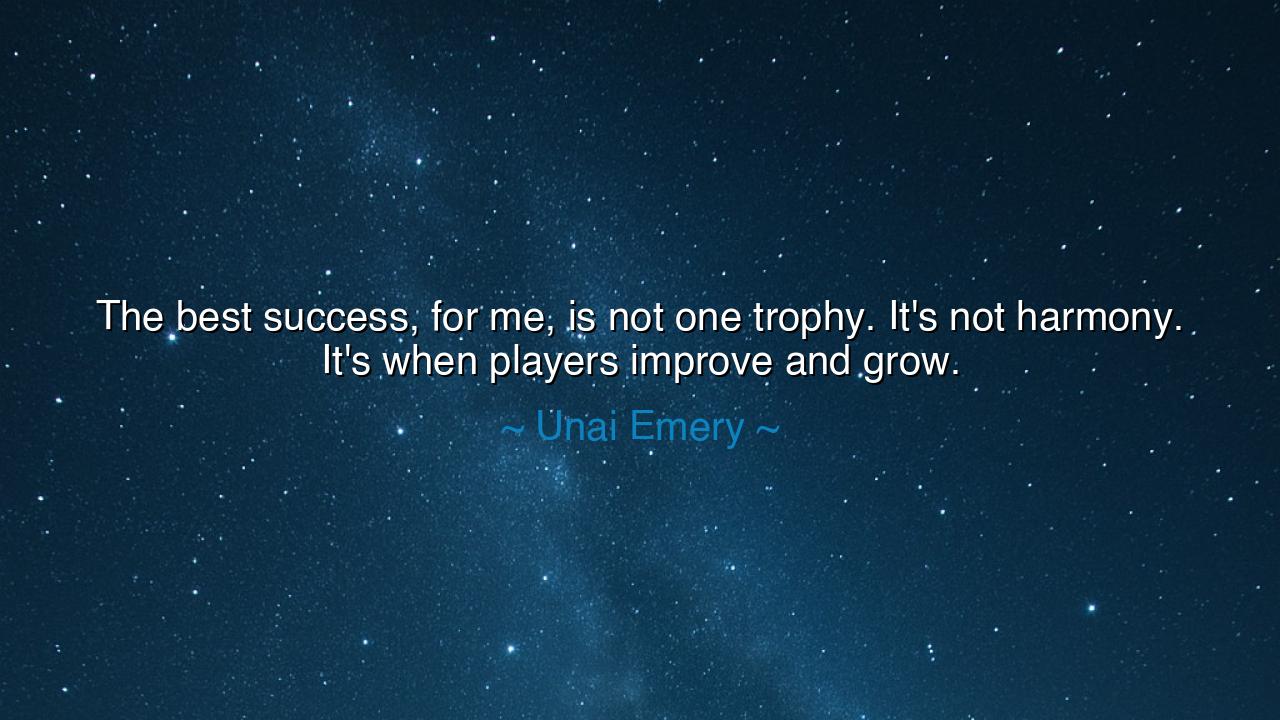
The best success, for me, is not one trophy. It's not harmony.
The best success, for me, is not one trophy. It's not harmony. It's when players improve and grow.






Hear the words of Unai Emery, spoken with the wisdom of a teacher and the heart of a leader: “The best success, for me, is not one trophy. It’s not harmony. It’s when players improve and grow.” These words carry a truth that reaches beyond the stadium and the game. They remind us that true greatness is not found in fleeting prizes or in shallow moments of calm, but in the transformation of human beings. For what is a trophy but metal that gathers dust? What is harmony if it lacks depth? Yet when a person grows, when a soul matures, when potential is cultivated into strength, then the fruits endure far beyond any single victory.
The ancients knew this truth well. The philosophers of Athens declared that the purpose of life was not possessions, nor the applause of crowds, but the cultivation of virtue and excellence. A teacher like Socrates sought not to win arguments, but to awaken the soul of his students, to set them on the path of wisdom. In the same spirit, Emery proclaims that the measure of a leader is not in what he claims for himself, but in what he awakens in those who follow him. Improvement and growth are the lasting monuments of leadership.
Consider the tale of John Wooden, the legendary coach of UCLA basketball. Wooden won many trophies, but he always taught that his true aim was to shape character, not just skill. His “Pyramid of Success” was built not on glory, but on industriousness, loyalty, and self-control. Decades after his teams had played their last games, his players continued to speak not of the medals they won, but of the lessons they carried into life. In this, we see the same wisdom Emery speaks: the real prize is not the silver cup, but the flourishing of those entrusted to you.
Unai Emery’s own career is proof of this philosophy. He has taken teams dismissed as ordinary and made them formidable, not by magic, but by teaching players to expand their vision and sharpen their craft. He is less concerned with a single shining moment than with steady progress, brick upon brick, until the whole becomes greater than the sum of its parts. His words reflect a truth that the wise always knew: success that is shallow fades, but growth that is nurtured lasts.
The meaning is both humbling and heroic: that the highest calling of a leader, a teacher, a parent, or a friend is not to seize glory for oneself, but to kindle greatness in others. To see another rise because of your guidance is a victory more enduring than any title. A trophy may be lifted once, but a life improved shines forever. This is success that transcends the moment and becomes legacy.
The lesson for us is clear: do not measure your worth only by your achievements or by the applause of the crowd. Ask instead: who has grown because of me? Who has improved because I walked beside them? What seeds of greatness have I planted in others? For when your days are finished, the world will not remember the medals on your shelf, but the people whose lives you helped to shape.
Practical action follows: wherever you stand—whether as leader of many or guide of one—commit to the growth of those around you. Encourage, teach, and support. Celebrate not only victories, but progress. Honor the small steps, the daily discipline, the unseen labor. If you focus not only on the outcome, but on the transformation, then your work will leave a legacy greater than any prize.
So let these words be remembered: “The best success is not a trophy, nor fleeting harmony. It is when others improve and grow.” This is the wisdom of leaders, the heart of mentors, the teaching of the ancients dressed in modern voice. Pursue this, and your life will be more than achievement—it will be an inheritance of greatness, carried forward in the lives of all you have touched.






AAdministratorAdministrator
Welcome, honored guests. Please leave a comment, we will respond soon